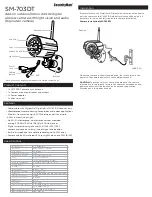
MAN XXXX 201
00
9-1
8. Electromagnetic Compliance (EMV)
When positioned within the direct vicinity of high
powered radio transmitting equipment (e.g. port-
%;6*($2!&*-P(U%B.P($!6."*P(9,*P(%4;#6%&"*P(
radio operators etc.) false activation switching may
;*(*B$*,.*&"*)C(U!7*<*,P(+2.-(.&1#*&"*(7.66(&!+(
damage the sensor electronics.
The automatic switching of the sensor will be
switched off as soon as the source of radio inter-
ference stops transmitting.
9. Trouble shooting - Practical hints
1. Lamp does not light up
- Tungsten halogen lamp defective
Replace tungsten halogen lamp
- No mains connection
Check connection by qualified electrician
- Incorrect setting of lux level
Correct setting of lux level
- Unit mounted too high
Mount at recommended height
- PIR detector lens obstructed by dirt or other
objects
Clean lens or remove objects
- Main fuse defective
Check or replace by qualified electrician
2. Delayed lamp activation
- Mounted too high
Mount at height stated in specification
(1.1 to 2.2 m)
- Direct line of approach
Re-direct walking so that the approach is not
frontally
3. Lamp stays on continuously
- Continual thermal activity detected ie. extractor
fan, central heating ducts
Check for any activity which could cause unit
detection to be maintained
- Delay time set too high
Reduce time delay
Check ambient noiselevel, if necessary switch off
noisesources
<=&&>*8*.(.*-2&-5&)(26+&
?2-.&"#&.-&.7+&8*2*8"8&!#+'*1'(.*-2@
- Mounted too high
Correct mounting height
- Temperature difference between ambient tem-
perature and source of heat too small
No improvement possible
- Direction of movement aimed directly at lens of
motion detector
Move laterally to detector
10. Range diagram
"2%,/.&/(-2!#6)(,*-#4*(%&)(=LH3E(-2!#6)(1%-2(
quickly (perhaps with some delay).
Actions in scenarios A + C:
Let the unit charge for approx. 10 mins.
D2*(;%++*,'(-2%66(2%<*(,*"2%,/*)(-#09".*&+6'(+!(
allow a few minutes of sensor operation.
Than for Scenario C, disconnect 230 VAC and
install shunt, and connect 230 VAC again.
For A + C now press the RESET button (near MIC
control). Since the battery is charged to nominal
voltage, the unit will reset and enter the start-up
$*,.!)(S=LH3E(-6!7(1%-2.&/TC(
After 60 secs the unit is operational and settings
can be performed as described below.
4. Adjustment of twilight-switch
and acoustic-sensor
4.1 Twilightswitch (LUX)
The luxlevel can be set between 40 and
2000 Lux
Night operation
Day and night operation
4.2 Timer (R1)
A( D2*()*6%'(+.4*,("%&(;*(%)X#-+*)(0,!4(
15 sec. to 16 min.
A( DLYDZ((
Use this mode for setting up operation.
Every movement will cause relay to switch
ON for 1sec. and than OFF again: walktest
LED-1 shows the current lux-level:
LED-1 = ON = bright
LED-1 = OFF = dark
A( (Y'4;!6(
Pulse/chime function
Every motion will turn ON relay for 1 sec
followed by a pause, (the next pulse can only
occur after pause).
In pulse mode , there is no need for MIC/
acoustic detection. The MIC-control has
therefor an alternative function, it determines
the duration of pause following a pulse:
MIC-control = min
= 9 sec.
MIC-control = 50 %
= 30 sec.
MIC-control = max
= 60 sec.
5. Technical data
A((
Supply voltage
230 VAC +6% / -10%
A((
Detection angle
180° horizontally
approx. 60° vertically
A((
Switching power
Ohmic load
3000 W, cos(
!
)= 1
Inductive load
1500 VA, cos(
!
)= 0.5
Electronic ballast 35 x 36 W
Minimum load
50 W
We can supply a capacitor if needed.
A((
Range
(at 1.1m mounting height)
max. 10 m for lateral walking
approx. 3 m for frontal walking
A((
Time settings
15 sec. to 16 min.
Pulse function 1sec.
A((
Twiglight switch
40 - 2000 Lux
A((
Dimensions
(L x W) 87x 87mm
Depth
36 mm
!""
Protection / class
"
IP20, II
!"
Enclosure material
"
PC
40
200
600
1200
2000
Tes
15
30
1
2
5
10
16
Mic
12 m
3 m
10 m
180°
1.10 - 2.20 m




















